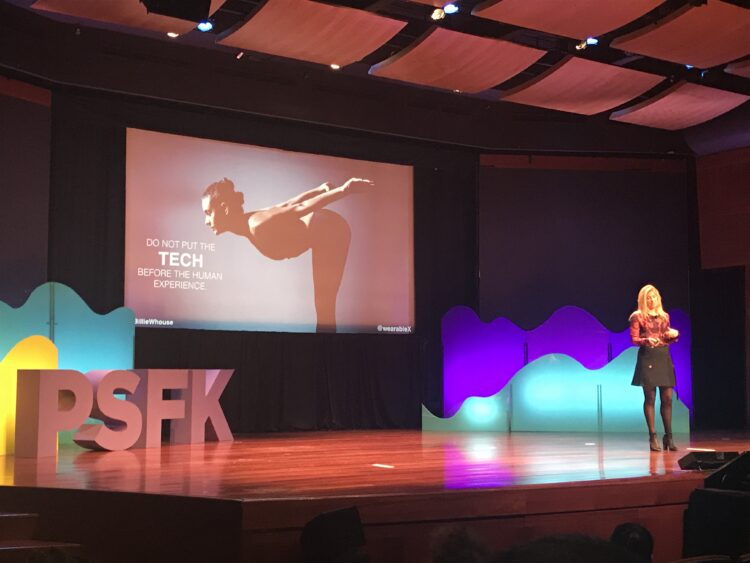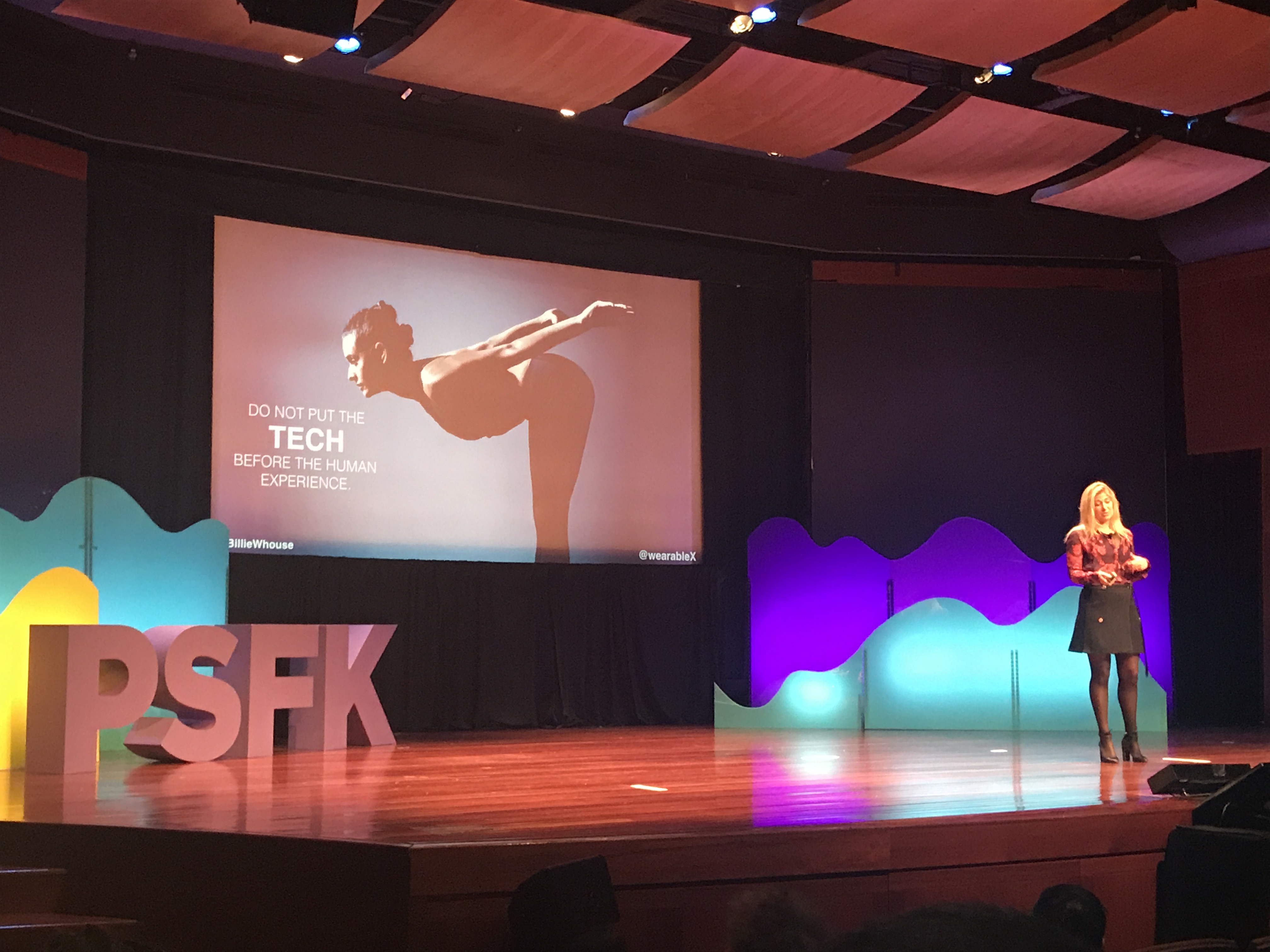PSFK is not your typical innovation conference. Ranked as the ‘Most Innovative Conference of 2016’ by Inc. Magazine, this one-day event brings together doers from a variety of industries to share ideas and breakthrough innovations. The topic of this year’s PSFK conference was “Innovation with Purpose.” Invitees delivered concise, well-crafted speeches that ranged from five minutes long (known at the conference as “Updates”) to fifteen minutes long (“Keynotes”), which impressed, amused, and inspired the audience.
Here are five powerful and purposeful businesses and ideas from this conference that inspired me, as a global citizen, a woman, and a workout enthusiast:
- what3words. This organization is making the world addressable – literally – with a new, simple methodology. Clare Jones, the company’s COO, opened her speech by sharing these staggering statistics: “75% of the world has a poor addressing system. Four billion of the world’s population are living without an address.” what3words is on a gigantic mission to change this!
As the company’s website explains, “We have divided the world into a grid of 3m x 3m squares and assigned each one a unique 3 word address.” For example, “smart.city.now” could be an address for a bench in Central Park; “together.beautiful.kind” could be an address for someone’s hut in the village of Kituku in Congo, Africa; and “hipster.fast.rank” could be a meeting spot for friends at a music festival that would help them connect and find each other quickly.
While the use applications for word3words’ mapping solution are plentiful for B2B and B2C businesses, several humanitarian and disaster relief organizations have also partnered with the company to use its technology to assist them in providing help where it is needed in the quickest possible way.
Thank you, what3words, for helping to save lives!
- Ginkgo Bioworks: The Organism Company. Ginkgo Bioworks views the human body as a platform for innovation. Christina Agapakis, the company’s Creative Director, described the human biology as “nanotechnology.” Agapakis introduced her company’s concept by explaining that, “Some cheeses smell like feet because the same bacteria that live on your feet also live in cheese.” She then proceeded to discuss multiple examples of how biology can help companies innovate, finally taking one example to the next level by describing how, to put it bluntly, poop can be a platform for innovative bio-design.
Ginkgo Bioworks has partnered with companies in the consumer electronics, food, agriculture, and health industries to bring biological knowledge to processes and products that people use every day. Adidas, Reebok, Patagonia, The North Face, Gunlocke, and IKEA are among companies working to infuse biology into their core mission.
Agapakis concluded her speech with the inspiring idea that, “[We can] imagine our biology as a new platform [on which] to innovate and design.”
Thanks to Ginkgo Bioworks, it is now clear that we do not need to venture far to start innovating!
- Dame Products. CEO & Co-Founder of Dame Products, Alexandra Fine, is approaching human biology from another angle. Hers is an innovative fem-tech company that has been investing time and effort into bridging the “pleasure gap,” the disheartening reality that 75 percent of all women never reach orgasm from intercourse alone. Dame Products is focused on creating smart toys for women and couples to solve this problem, and to follow its mission of “making the world a happier place, one vagina at a time.”
The company’s approach to building products seems to be anchored in the lean startup methodology and includes the following stages: (1) Empathize, (2) Define, (3) Ideate, (4) Prototype, and (5) Test. Selection bias, the difficulty of getting people to chat, and a lack of understanding of the problem are the key challenges for the company, but Fine is boldly charging forward!
My personal conclusion: ladies, we have hope!
- Wearable X. This wearables company combines fashion and technology to improve the quality of life for all people. It will soon be launching Nadi X, a line of yoga-pants that give feedback on one’s pose and guides one’s alignment of knees and hips.
Billie Whitehouse, the company’s founder & CEO, explained certain important principles on which the company operates:
- Do not put technology before the human experience
- Design for all five senses (the company use haptic vibration and human skin as an interface for communication between the human and technology)
- Design for discovery
These new yoga-pants will be a helpful guide for all the yogis out there, whether newbies or seasoned practitioners.
- I know you have all heard of at least one of these, but this could be the most simple but actionable example of success advice out there! Colin Beavan, the author of “Success in Everything that Matters,” has studied so-called “life-questors,” those people who do not follow conventional ways of living.
After extensive research Beavan realized that “life-questors” have one thing in common: friends. While this sounds simplistic (after all, only those of us who live in caves do not have friends), there is more depth to Beavan’s discovery. He believes that the success of an interconnected personal community of 6-12 friends depends on both, (1) regular communication of each member with the community, and (2), regular communication between members within the community.
Beavan encouraged everyone in the audience to build a new, or join an existing mini-community and to meet weekly or bi-weekly as an ongoing practice.
Impressed by PSFK’s format, content, and friendly ambiance, I approached Scott Lachut, the company’s President of Research & Strategy to ask several questions.
What do you hope that audiences will gain from the conference?
Our goal is (and our value is in) providing our attendees with lateral inspiration that gives them insight into how other people and industries approach innovation, and helps them to get outside of their bubbles. Too often companies approach innovation by looking only at direct competitors, which leads to a “follow first” mentality and contributes to only incremental change. Our hope is that PSFK attendees apply the things they’ve learned here to their own jobs, or better yet, get inspired to create on their own so that they can come back and speak at a future event.
You bring together speakers of various backgrounds. What do you look for when selecting a speaker? What do the share in common?
First and foremost we look for speakers that have a compelling story to tell. The last thing we want is for someone to get up on stage and give a sales pitch. We want them to educate our audience about which opportunity or challenge they saw in the marketplace, how they approached the solution, and which things that they learned along the way. In most instances, these speakers are disrupting the status quo in some meaningful way and are ultimately looking to make the world better.
Why and how did you decide on the format for the day?
Scott: We feel the condensed format of the talks allows us to share a greater diversity of content while challenging the speakers to home in on the message that they want to convey. This hopefully keeps the day fresh and dynamic with plenty of insights to take away. In terms of the structure, we try to order the talks to help create intentional connections between speakers so that there’s an underlying (if not always obvious) flow. At the end of the day, it’s always interesting to hear what big ideas resonated with the attendees each day. Because we’re always writing about inspiring people on PSFK website and interviewing experts for our trend reports, we have the benefit of choosing from a great roster of potential speakers.




